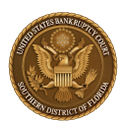You are here
Judges Info
| Judge Directory | Location |
|---|---|
| Chief Judge Scott M. Grossman |
LOCATIONUNITED STATES BANKRUPTCY COURT |
| Judge Paul G. Hyman, Jr. (Recall) |
LOCATIONUNITED STATES BANKRUPTCY COURT |
| Judge Laurel M. Isicoff |
LOCATIONUNITED STATES BANKRUPTCY COURT |
| Judge Erik P. Kimball |
LOCATIONUNITED STATES BANKRUPTCY COURT |
| Judge Corali Lopez-Castro |
LOCATIONUNITED STATES BANKRUPTCY COURT |
| Judge Robert A. Mark |
LOCATIONUNITED STATES BANKRUPTCY COURT |
| Judge Mindy A. Mora |
LOCATIONUNITED STATES BANKRUPTCY COURT |
| Judge Peter D. Russin |
LOCATIONUNITED STATES BANKRUPTCY COURT |
